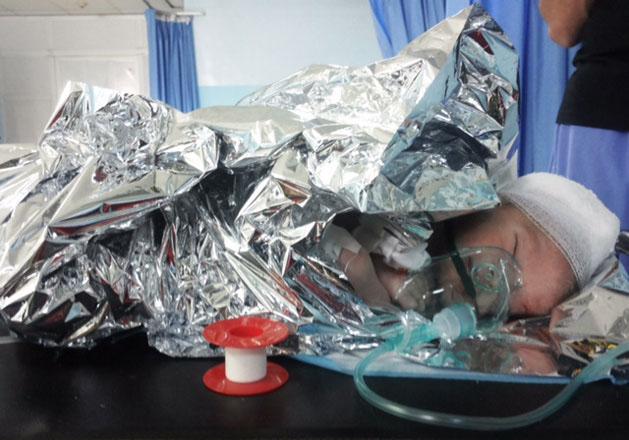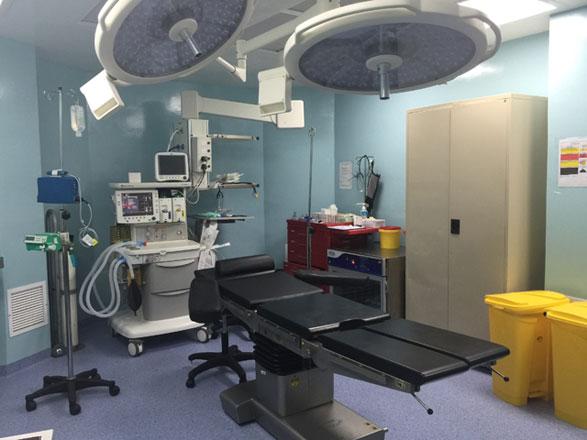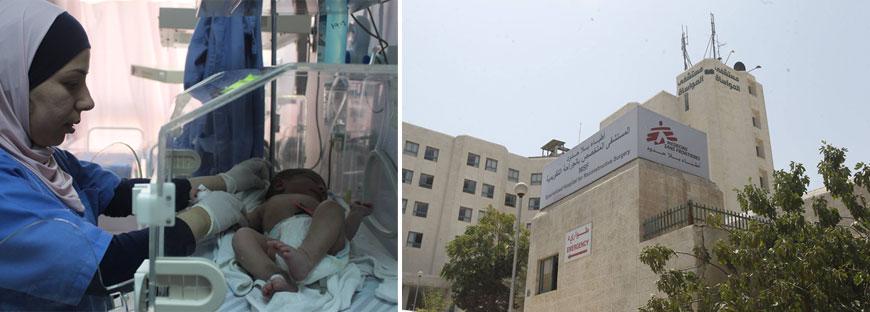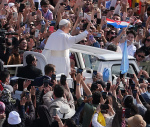You are here
Ramtha hospital receives more than 65 Syrian war-wounded patients over past two weeks
By JT - Jul 09,2015 - Last updated at Jul 09,2015

Majed, 27 days old, receives treatment from Médecins Sans Frontières at the Ramtha Hospital emergency room for a head injury caused by shrapnel from an explosive barrel bomb (Photo courtesy of MSF)
AMMAN — More than 65 Syrian war-wounded patients — most of whom were injured by barrel bombs — arrived at the Ramtha Hospital emergency room in the past two weeks, marking a significant spike in the number of cases seen by Médecins Sans Frontières (MSF).
In a statement sent to The Jordan Times, the international medical humanitarian organisation said the emergency room received 34 injured Syrians in a three-day period during the last week of June, some of whom were stabilised by MSF medical teams and referred to other hospitals.
The rest continue to receive surgical and rehabilitative treatment in the facility, 90km north of Amman and less than 5km from the Syrian border, where MSF works in close collaboration with the Ministry of Health to provide medical care to Syrian patients, the statement said.
“More than 70 per cent of wounded we receive suffer from blast injuries, and their multiple wounds tell their stories,” the statement quoted Renate Sinke, project coordinator of the MSF Ramtha Emergency Surgical Programme, as saying.
MSF and many other organisations have been calling repeatedly for an end to the bombing of populated areas inside Syria; these calls have had no impact, the statement said.
Patients of all ages continue to arrive at the MSF facility in large numbers with injuries that they said were caused by barrel bombs dropped by helicopters on residential areas and health structures in south Syria, it added.
One recent patient who arrived at the facility was 27-day-old Majed, who has a head injury caused by shrapnel from an explosive barrel bomb, MSF said.
“At 9am, a barrel bomb hit our house in Tafas; I was not around at that time. I have to work to feed and take care of my family. When I heard the news, I dropped what I was doing and I ran to the house as fast as I could,” Majed’s father, Murad, said.
“I found my wife and mother both injured but their injuries did not look too severe, then I saw my little boy. He was quiet and his head seemed to be injured, I took him to the field hospital in Tafas. They tried to help him but couldn’t, since the appropriate equipment is not available in Syria. He needed to go to Jordan for treatment. It took us one-and-a-half hours from the time of injury till we arrived at the border, and some more before arriving in Ramtha. Now, all I want is for my baby to be better and go back to Syria,” he added.
There have been reports on health facilities coming under attack in Daraa governorate in the past two weeks, which led an increasing number of Syrian patients to take the risk and endure long trips to cross the Jordanian border, seeking access to medical care that has become extremely difficult to receive in their home country, the statement said.
A “significant proportion of patients we receive have suffered head injuries and other multiple injuries that cannot be treated inside southern Syria as CT-scans and other treatment options are limited”, said Dr Muhammad Shoaib, medical coordinator of MSF in Jordan.
At present, many hospitals inside Syria suffer from limited capacity to deal with highly complex injuries, lack the manpower and medical expertise, or the necessary equipment, since it sustained damage or destruction in these attacks, depriving much-needed medical care to Syrian patients and contributing to the overall deterioration of healthcare, the MSF statement said.
Since the Syrian conflict began in March 2011, over four million Syrians have sought refuge in neighbouring countries, including Jordan.
MSF, which has been present in Jordan since August 2006 with a reconstructive surgery programme located in Amman, started working to support refugees and patients in 2013 through the Ramtha emergency trauma surgical programme, as well as a mother and child hospital, and two non-communicable disease projects in Irbid to support Syrians refugees and vulnerable Jordanians in host communities.
Related Articles
RAMTHA — Médecins Sans Frontières (MSF) has provided emergency medical care to over 2,000 war-wounded Syrians and performed over 800 major s
AMMAN — At least 59 war-wounded Syrians, including 11 children between the ages of 3 and 14, “have been denied medical evacuation into Jorda
AMMAN — Médecins Sans Frontières (MSF) eyes further official Jordanian facilitation for the process of cross-border aid supply to hospitals
















